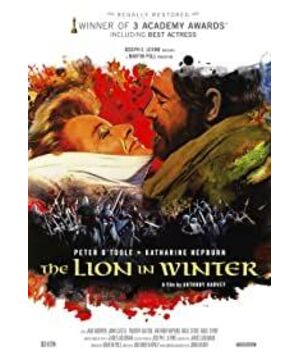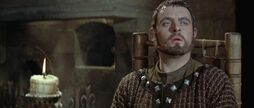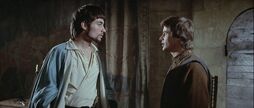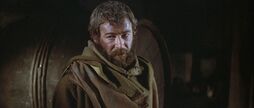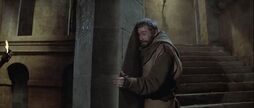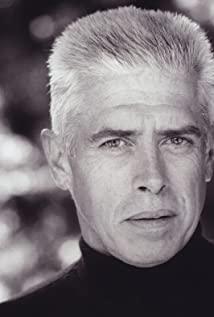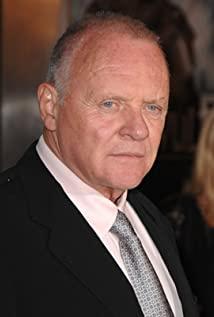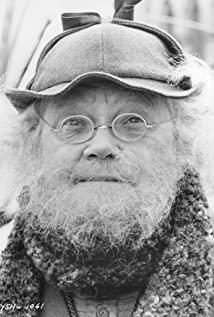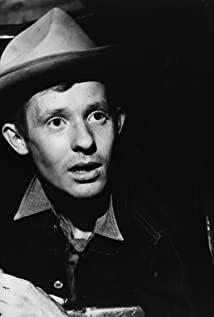A royal Christmas party is more like a family reunion. Behind the intertwined love-hate emotions are each other's plans, intrigue, and family affection has become the embellishment of playing tricks and tricks. Peter O'Toole (Henry II) and Katharine Hepburn (Katharine Hepburn) as Eleanor "tear", quite wonderful. The three princes, fighting for power and land, each have their own attributes. Only the "marginal" King Philip of France was ambiguous in this power struggle.
Henry II's wife was the ex-wife of Philip's father, Louis VII, and Henry II's lover, Alice, was Philip's sister. It looked like a reunion of distant relatives, a gathering of the two royal families. In fact, this bystander is looking at his chess piece. At first glance, it seems that the second prince Geoffrey and Philip are playing chess. The second prince, who was not favored by his parents and had no right of inheritance, saw that Philip was his ally, and he wooed or took advantage of the greed of the third prince, John. Likewise, Philip took advantage of their greed and stupidity. He was cunning in that he promised an alliance, but never acted. He knew very well the key man Henry II.
Henry II and Timothy Dalton played Philip II of France in three "fighting scenes". The most exciting is the third game, the three princes and Henry II came to Philip successively. The old fox didn't put Louis VII's son in his eyes, even Lao Tzu couldn't fight him, let alone Maotou boy. Henry gestured many times and said, "You (Philip) are still a child." Philip tried his best to deny the definition of boy as king, and his mentality still had an impetuous and naive side. In the first two confrontations, both ended with Philip leaving in anger. In the third paragraph, the perspective begins with the second prince knocking on the door, the third prince is already inside, and a few words from Philip make the two fall apart. The unexpected visit of the eldest prince, Philip did not shy away from his ambiguous relationship. When he said "And what else?" again and again, he seemed to be playing a small temper, and seemed to be indifferent. During this exchange with Richard, he reaches out and Richard is completely in his control. Facing the last visit of Henry II, Philip still did not change his face and maintained his inherent style. When Henry was complacent, Philip shook his baggage, and his relationship with Richard was not only shown to the other two princes, but also made Richard jump out himself and admit it in public in front of his father.
Richard said "you love me" and
Philip said "never"
This was a key stroke that made Henry make up his mind to give up his eldest son to inherit the throne. For Philip, stirring up their conflict with each other and causing them to disintegrate within is the most effective revenge. From being calm and looking like an outsider, to taking part in it with a cold eye, the real chess player is always Philip. So, Henry considered divorce, had a baby with Alice, and re-selected an heir. Eleanor had to take her sons to rebel.
In late 1967, Peter O'Toole recommended the 23-year-old Timothy for the role of the young King Philip of France. In this star-studded film, which won seven nominations and three awards at the 41st Academy Awards (1969), the role of Philip was a bright spot for the audience. The young and handsome Wang seems to be calm and calm, but once he touches the sore spot, he looks childish, and he can't help but fight for a while. In the confrontation between you and me, you sometimes chatted and laughed, and sometimes you were full of provocation, and the young and promising Philip II, who succeeded to the throne at the age of fourteen, played it vividly.
Philip II was the first powerful monarch of the Capetian dynasty. In the early days of his administration, he first tried to get rid of the shackles of the regency. At the age of fifteen, he left the regent alone and negotiated and signed a treaty with the visiting King Henry II of England, isolating the Champagne family. In order to weaken Henry II's power, he tried his best to provoke Henry's relationship with his sons. The ambiguity between Philip II and Richard I in the film is a metaphor for the political and military cooperation and differences between the two. He supported the rebellion launched by Richard and John in the later years of Henry II, and after Richard succeeded to the throne, he actively planned to attack Richard. He and Richard collaborated and parted ways in the Third Crusade, including the continuous encroachment of the territories of the Plantagenet Dynasty (all territories of the Plantagenet family in France), etc., and Philip II gradually regained what originally belonged to him. everything of. Knowing this history and looking back at the film, you can understand the performance of the character Philip, and feel that in just a few scenes, Timothy brought the mood of Philip II to the fullest. Young yet steady, impulsive yet strategic, with deep scheming, playing with others on top of applause, a young heart is beating.
In an interview after the film's release, Timothy thanked Peter O'Toole for giving him such an opportunity, and thanked Katharine Hepburn for his care and concern for his newcomer. As an audience, we really have to thank this "Lawrence of Arabia" for giving us the opportunity to see such a wonderful performance, to see Timothy's cooperation with him, and to see the tension and support.
View more about The Lion in Winter reviews


